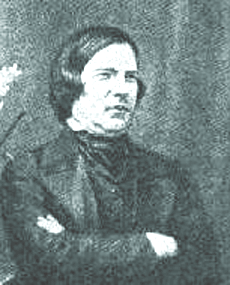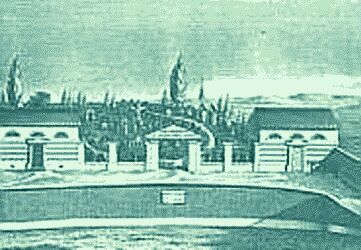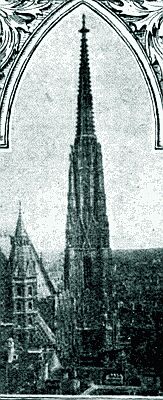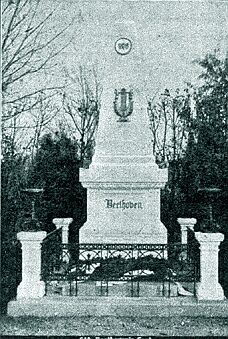 Robert Schumann |
The musician who visits Vienna for the first time might enjoy the festive glamour of the streets (of Vienna) for some time and will also often have paused in amazement before St. Stephen's Cathedral; soon, however, he will be reminded that, not far from the city, there lies a churchyard (that will be) more important to him than anything else that might be worthy of seeing in this city, where two of the glorious (representatives) of his art rest, only a few steps apart. Thus there may--as I have done--many a young musician have taken a walk out to the Währing cemetery after the first few noisy days of his stay, in order to leave behind a floral offering on those graves, and be it a bush of wild roses as I saw them planted on Beethoven's grave. Franz Schubert's resting place I found unadorned. Thus, at last, a fervent whish had been fulfilled in my life, and I looked at both holy graves for a long time...
 The Währing Cemetery |
To look into the eyes of a great man for the first time, to shake his hand, must belong to the most hoped-for moments. If it was not my fortunate destiny to meet both of these artists that I revere most of all never artists, during their lifetimes, I would, at least, have loved to have someone by my side at their gravesites who had been close to them, and preferably, so I thought, these should have been one of their brothers. On my way home, it occurred to me that Schubert's brother Ferdinand was still alive of whom he, as I knew , thought highly. Soon, I looked him up and found him to bear some resemblance to his brother, as it appeared to me in comparison to the bust that stands by Schubert's gravesite: rather short in height, yet sturdily built, honesty as well as musicality in his facial expression. He knew me from my reverence for his brother as I had often publicly expressed it, and he told and showed me a great deal of which a report had also been rendered (by me) earlier in this periodical under the title "Reliquien" (relics), with his approval. Ultimately, he also allowed me to take a look at the treasures of Franz Schubert's compositions that were still in his hands. The wealth that lay piled up before me here filled me with shudders of joy; where to begin, where to end? Amongst other things, he pointed out to me the scores of several symphonies, many of which have not even been heard, yet, while (they were) often taken up but put aside again as too difficult and meandering in their expression. One has to know Vienna and its peculiar "concert situation", the difficulty of gathering the means for larger performances in order to (be able to) forgive that there, where Schubert had lived and worked, little to nothing is being performed of his larger instrumental works except his lieder. Who knows how long this symphony, too, which we are discussing today, would have lain there, hidden away, gathering dust, had I not come to an understanding with Ferdinand Sch. to send it to Leipzig to the direction of the Gewandhaus Concerts or to the artist himself who is in charge of them and whose fine eye shyly blossoming beauty does not escape, let alone this obvious, glorious, masterful one. Thus it was accomplished. The Symphony arrived in Leipzig, was heard, understood, listened to again and admired joyfully, almost generally...
Let me say it quite openly: he who does not know this symphony does not know much of Schubert, yet, and that may, after all that Schubert has already given to art, not be accepted as credible praise, indeed. To the dismay of composers, it has often been said "to stay away from symphonic plans, after Beethoven"; and it is, partially, also true that, besides a few more important orchestral works,--that, however, held more interest with respect to the educational processes of its composers, yet, did not exercise a decisive influence on the masses as well as on the progress of the genre, most of them were only a weak reflection of Beethovenian tunes, not to think of those boring symphony writers who had the strength to re-create Haydn's and Mozart's powder and wigs, yet, without the heads belonging to them. Berlioz belongs to France and is mentioned here and there as a foreigner and dare-devil. As I had guessed and hoped and others with me that Schubert, who already shows himself firm in his form, endowed with a rich fantasy and versatile in many other genres, will also attack symphony from his angle and that he would find the right place from which the masses will be attracted by it, has now been proven in the most wonderful manner. Certainly, he did also not think of continuing Beethoven's Ninth; rather, as a most hard-working artist, he continually created out of his own sources, one symphony after another, and that the world will soon get to know his seventh, without having followed his symphonic development and without knowing its forerunners, is perhaps the only thing that one might regret at its publication, which, in itself, will also be a cause for misunderstandings with respect to the work. Perhaps also the other ones will soon be released; (even) the most unimportant one of them will still have its "Franz Schubert" meaning; well, the Viennese art patrons who were looking for new symphonies would not have had to look all that for for the laurels that they so desperately yearned for, since these lay piled on top of each other sevenfold in Ferdinand Schubert's study in a Viennese suburb. Here, a worthy laurel wreath was to be bestowed, for once.
It is often like that: if one, for example, speak of ---- in Vienna, then they cannot get enough of praising their Franz Schubert; however, when they are amongst themselves, neither the one nor the other means something special to them. Be it as it may, let us rejoice at the wealth of genius that shines forth out of this work. It is true, this Vienna with its St. Stephen's Cathedral, its beautiful women, its official glamour, and how it, splendidly begirded by the windings and arms of the Danube, stretches out into the blossoming plan that gradually rises up to ever higher mountains, this Vienna with all its memories of the greatest German masters, has to be a fertile soil for musicians. Often, when I looked at it from its surrounding mountains, it occurred to me how, many a times, Beethoven's eye might have wandered off into the far distance of the Alpine peaks, how Mozart might often have followed the course of the Danube, entranced in thought, and how father Haydn might have looked at the steeple of St. Stephen's cathedral, shaking his head at its dizzying height. The images of the Danube, of St. Stephen's and of the distant Alpine peaks together, coated with a bit of fragrance of Catholic incense, and one can behold an image of this city; and if now, this charming landscape moves completely before our eyes, then those chords will sound again that have never sounded in us, yet. In Schubert's symphony and its bright, blossoming romantic life, this city appears before me more clearly than ever, and it becomes clear to me again how in this very environment, such works could have been born.
 St. Stephen's Cathedral in Vienna |
I do not want to attempt to put a foil over this symphony; the different age groups choose too differently with respect to the texts and images they attach to these works as their basis; the eighteen-year-old youth often hears earth-shattering events in music, where a mature man only perceives a national event, while the musician neither thought of the one nor of the other and merely wrote his best music that he had in his heart. That the outer world, however, as it shines today and as it darkens tomorrow, often reaches into the innermost of the musician and poet, that one should believe, as well, and that there lies hidden in this symphony more than a merely beautiful song, more than mere suffering and joy as music has already expressed it a hundred times, nay, that it leads us into a region of which we cannot recall as ever having entered it, before; in order to admit this, one listen to such a symphony. Here, there is, besides masterly musical technique and composition, still life in all its fibers, finest nuances in color, meaning everywhere, clearest expression of detail, and over all of it, finally, there is poured a romanticism as one already knows it of Franz Schubert from elsewhere. And this heavenly length of the symphony, like a long novel in four volumes as for example by Jean Paul, who can also never find an end, and that for the best reasons, in order to let the reader re-create, afterward. How this replenishes us, this feeling of abundance everywhere, while one, with others, always has to fear the end and is so often disappointed about being misled. It would be incomprehensible where Schubert would, all of a sudden, have taken this playful, brilliant mastery to deal with the orchestra from if one did not know that this symphony was preceded by six others and that he wrote this one at the time of his greatest maturity. An extraordinary talent it always has to be called that he who had not heard his own instrumental works very often during his lifetime, would arrive at such a unique style of treating the instruments as well as the mass of the orchestra that often converse with each other like the human voice and chorus. This similarity to the human voice I have not, also not in any Beethovenian symphonies, heard so stunningly close and so surprisingly, anywhere; it is exactly the opposite to Meyerbeer's treatment of the human voice.
The complete independence in which this symphony stands to those of Beethoven, is another sign of its mature origin. Here, one can see how appropriately and wisely Schubert's genius reveals itself. To imitate grotesque forms, the daring relationships, as we find them in Beethoven's later works, he avoids, being aware of his modest forces; he gives to us a work in most graceful form, and, yet, one that shows a new path, nowhere leading too far off its center, always returning to it. Thus it must appear to everybody who looks at this symphony more often. At first, the glamour and novelty of its instrumentation, the width and breadth of form, the graceful change of moods, the entire new world into which we are transported, will confuse one or the other (listener), as also every first glance at the unfamiliar; yet, there also still remains the sublime feeling as, for example, that after we have attended the performance of a fairy tale or a magical play; everywhere, one feels that the composer was master of his visions, and the connection will become clear to you, in time. Right at the outset, this impression of certainty is conveyed in the richly adorned, romantic introduction, although everything still appears mysteriously veiled. Completely new is also the crossover into the Allegro; the tempo does not even appear to change, we have arrived and do not know how. To dissect the different movements will neither bring joy to us nor to others; one would have to copy the entire symphony in order to convey an impression of the novel character. Only from the second movement that speaks to us with such moving voices, I do not want to part without saying a word about it. In it, there is also a part in which the horn seems to be calling as from afar, that appears to be descending down from another sphere to me. Here, everything is listening, as if a heavenly guest was quietly walking through the orchestra.
The symphony has had an effect on us like none other after Beethoven's symphonies. Artists and friends of art united in its praise, and of the master who rehearsed it most carefully so that it could be heard splendidly, I heard a few words that I wish I could have conveyed to Schubert, perhaps as the most joyful message for him. It might be that years will pass until it (the symphony) will be at home in Germany; that it will be forgotten, overlooked, there is no fear of that; it bears in itself the eternal fountain of youth.
Thus my gravesite visit that reminded me of a relative of the deceased, brought me a second reward. The first, I already received on that first day; on Beethoven's grave, I found a steel pen that I kept carefully. Only for festive occasions such as today do I use it and hope that something pleasant flowed from it.
 Beethoven's Gravesite |